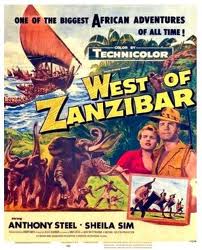West of Zanzibar (1954 film)
| West of Zanzibar | |
|---|---|

U.S. theatrical poster
|
|
| Directed by | Harry Watt |
| Produced by | Leslie Norman |
| Written by |
Max Catto Jack Whittingham Story Harry Watt |
| Starring | Anthony Steel, Sheila Sim |
| Music by | Alan Rawsthorne |
| Cinematography | Paul Beeson |
| Edited by | Peter Bezencenet |
|
Production
company |
|
| Distributed by | General Film Distributors |
|
Release date
|
March 1954 (UK) |
| Country | United Kingdom |
| Language | English |
West of Zanzibar is a 1954 British adventure film directed by Harry Watt and starring Anthony Steel, Sheila Sim and Edric Connor.
It is a sequel to Where No Vultures Fly (1951), from the same director and producer, and continues the adventures of game warden Bob Payton, played again by Anthony Steel. The subject of the film is ivory smuggling, and although the film appears to side with the African natives against economic exploitation, it was banned by the government of Kenya, which considered its approach too paternalistic.
The rural African Galana tribe move to Mombasa following a drought. The tribe's peaceful ways are destroyed by the influence of illegal ivory traders. Game warden Bob Payton turns detective, travelling to Zanzibar to discover the ringleader behind the ivory smuggling. Payton tracks his quarry through some of the most treacherous passages of the Zanzibar territory. Despite obstacles which include crocodiles and rhinos, Payton finally corners the villain. The gang's ringleader has given an African tribe land in return for ivory tusks, but he is repaid for his scheming when the tribe turns on him.
At one stage it was planned for the movie to be shot in 3-D but this did not happen.
Like the first movie, it was shot on location in Africa. The unit arrived in Nairobi in January 1953.
A popular local dance song during the shoot was a Swahili folk song called "Jambo Sigara Baridl". The filmmakers liked the melody so much they decided to include it as background music. Then it was decided to prepare an English version of the song, with Anthony Steel singing lead vocals, along with a band, the Radio Revellers. When asked if he could sing, Steel replied, "Apart from making gurgling noises in the bath, I've never tried." Steel recorded the song anyway and it was a success on the charts.
Kenya's film censors banned the film on the grounds it would hurt race relations in the country.
The movie was also banned in India after the protests of African students in that country.
In 1957, the film was listed as among the seventeen most popular movies the Rank Organisation ever released in the US.
...
Wikipedia
